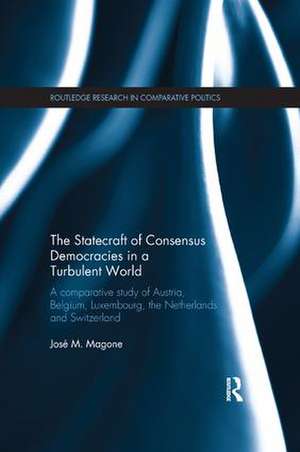The Statecraft of Consensus Democracies in a Turbulent World: A Comparative Study of Austria, Belgium, Luxembourg, the Netherlands and Switzerland: Routledge Research in Comparative Politics
Autor José Magoneen Limba Engleză Paperback – 14 aug 2018
Taking a multi-dimensional and multi-spatial approach, this book examines the West central European consensus democracies of Austria, Belgium, Luxembourg, Netherlands and Switzerland, over the past 40 years. Magone examines how these democracies have been transformed by Europeanization thrusts and global turbulence yet are able to maintain political stability. It provides historical context including the different phases of transformation: the golden period (1945-1979); disorganised capitalism (1979-1993); and re-equilibration (1993-). It includes chapters on political culture, government, parliament, the rise of populism and political parties, subnational government, and the political economy and concludes deliberating on the relevance of consensus democracies’ experiences for the future of European and global governance.
Based on original research, this book will be of strong interest to students and scholars of comparative politics, European government, West European politics, the politics of small states in Europe, and those with a particular interest in the politics of Austria, Belgium, the Netherlands, Luxembourg and Switzerland.
| Toate formatele și edițiile | Preț | Express |
|---|---|---|
| Paperback (1) | 304.06 lei 6-8 săpt. | |
| Taylor & Francis – 14 aug 2018 | 304.06 lei 6-8 săpt. | |
| Hardback (1) | 849.37 lei 6-8 săpt. | |
| Taylor & Francis – 13 dec 2016 | 849.37 lei 6-8 săpt. |
Din seria Routledge Research in Comparative Politics
- 9%
 Preț: 1039.13 lei
Preț: 1039.13 lei -
 Preț: 385.40 lei
Preț: 385.40 lei - 9%
 Preț: 1005.50 lei
Preț: 1005.50 lei -
 Preț: 191.93 lei
Preț: 191.93 lei - 18%
 Preț: 1002.80 lei
Preț: 1002.80 lei -
 Preț: 495.94 lei
Preț: 495.94 lei - 18%
 Preț: 1056.47 lei
Preț: 1056.47 lei - 30%
 Preț: 333.04 lei
Preț: 333.04 lei - 18%
 Preț: 1054.27 lei
Preț: 1054.27 lei - 18%
 Preț: 1075.49 lei
Preț: 1075.49 lei - 18%
 Preț: 1058.79 lei
Preț: 1058.79 lei - 18%
 Preț: 1062.98 lei
Preț: 1062.98 lei -
 Preț: 413.76 lei
Preț: 413.76 lei - 18%
 Preț: 1062.98 lei
Preț: 1062.98 lei - 18%
 Preț: 1059.00 lei
Preț: 1059.00 lei -
 Preț: 425.86 lei
Preț: 425.86 lei - 18%
 Preț: 1106.36 lei
Preț: 1106.36 lei - 18%
 Preț: 1058.65 lei
Preț: 1058.65 lei - 18%
 Preț: 1061.06 lei
Preț: 1061.06 lei - 18%
 Preț: 1058.79 lei
Preț: 1058.79 lei - 15%
 Preț: 671.28 lei
Preț: 671.28 lei - 18%
 Preț: 1062.98 lei
Preț: 1062.98 lei -
 Preț: 334.41 lei
Preț: 334.41 lei - 18%
 Preț: 1055.21 lei
Preț: 1055.21 lei - 18%
 Preț: 1056.80 lei
Preț: 1056.80 lei - 18%
 Preț: 956.83 lei
Preț: 956.83 lei - 18%
 Preț: 1064.01 lei
Preț: 1064.01 lei - 18%
 Preț: 1057.05 lei
Preț: 1057.05 lei - 18%
 Preț: 1068.18 lei
Preț: 1068.18 lei - 18%
 Preț: 1217.29 lei
Preț: 1217.29 lei - 15%
 Preț: 701.96 lei
Preț: 701.96 lei - 18%
 Preț: 703.93 lei
Preț: 703.93 lei - 18%
 Preț: 703.09 lei
Preț: 703.09 lei - 18%
 Preț: 1065.30 lei
Preț: 1065.30 lei - 18%
 Preț: 1059.48 lei
Preț: 1059.48 lei - 28%
 Preț: 819.25 lei
Preț: 819.25 lei - 18%
 Preț: 1055.51 lei
Preț: 1055.51 lei - 18%
 Preț: 1052.35 lei
Preț: 1052.35 lei - 28%
 Preț: 849.37 lei
Preț: 849.37 lei - 18%
 Preț: 999.82 lei
Preț: 999.82 lei - 18%
 Preț: 1059.84 lei
Preț: 1059.84 lei -
 Preț: 392.48 lei
Preț: 392.48 lei - 18%
 Preț: 1064.52 lei
Preț: 1064.52 lei -
 Preț: 502.30 lei
Preț: 502.30 lei - 18%
 Preț: 1006.60 lei
Preț: 1006.60 lei - 18%
 Preț: 1066.09 lei
Preț: 1066.09 lei
Preț: 304.06 lei
Preț vechi: 351.39 lei
-13% Nou
Puncte Express: 456
Preț estimativ în valută:
58.19€ • 63.18$ • 48.88£
58.19€ • 63.18$ • 48.88£
Carte tipărită la comandă
Livrare economică 22 aprilie-06 mai
Preluare comenzi: 021 569.72.76
Specificații
ISBN-13: 9781138361942
ISBN-10: 1138361941
Pagini: 364
Ilustrații: 56
Dimensiuni: 156 x 234 x 34 mm
Greutate: 0.67 kg
Ediția:1
Editura: Taylor & Francis
Colecția Routledge
Seria Routledge Research in Comparative Politics
Locul publicării:Oxford, United Kingdom
ISBN-10: 1138361941
Pagini: 364
Ilustrații: 56
Dimensiuni: 156 x 234 x 34 mm
Greutate: 0.67 kg
Ediția:1
Editura: Taylor & Francis
Colecția Routledge
Seria Routledge Research in Comparative Politics
Locul publicării:Oxford, United Kingdom
Public țintă
Postgraduate and UndergraduateCuprins
1. The Statecraft of Consensus Democracies
Introduction: Political Change in Consensus Democracies2. The Creation and Development of Consensus Democracies
Conceptualizing Consensus Democracies
Strategic Management in Consensus Democracies: A Permanent Process of Re-equilibration
The Great Transformation of the Late Twentieth Century and Consensus Democracies
From International to Global Politics and Governance
Europeanization of National Politics: From Government to Multilevel Governance
Politics: Political Change, Insecurity and the Rise of Populism
National Political Economy: Adjusting to Globalization
Society: De-nationalization and Social Investment
Structure of the Book
Conclusions: The Consensus Democracies of West Central Europe
The Three Main Spaces of West Central Europe Until the Early Nineteenth Century
Rise and Decline of the Habsburg Empire (1273-1866)
Between Autonomy and Centralization: The Origins of the Netherlands, Belgium and Luxembourg (1300-1848)
The Difficult Road to Internal Statehood: The Case of Switzerland (1291-1848)
The Making of Consensus Democracies (1815-1945): The Nationalization of Politics
The Nationalization of Politics in Austria: The Difficult Mentality Change from Empire to Small State
Switzerland: From Civil War to a Virtuous Evolution towards Inclusive Democracy
The Netherlands: Evolutionary Democracy in a Centralized State
Belgium: From a Model Constitution to a Consensual Democracy
Luxembourg: Reinventing its Identity through Democratisation
The Glorious Thirty: Consensus Democracies in National Capitalism
Austria: Consensus Politics as a New Found Political Culture of National Unity
Switzerland: The ‘Magic Formula’ and the Continuity of Consensus Politics
The Netherlands: Consensus Democracy and the Scientification of Policy Making
Belgium: Consensus and Conflict in a Divided Country3.Constitutional Change in Consensus Democracies
Luxembourg: The Creation of a National Model
A Turbulent World Since 1980: Re-equilibrating Consensus Democracies
Austria: The Politics of Memory and European Integration
Switzerland: Consensus and Populism in Turbulent Times
The Netherlands: Reviving the Polder Model
Belgium: From Unitary to a Federal State
Luxembourg: Consensus as a Way of Life
Conclusions: Crafting Consensus Democracies in Turbulent Times
Introduction4. Society and Civic Culture Introduction: The Complexity of Consensus Democracies
Longevity of Constitutions and Change in Consensus Democracies
Sketching the Political Institutional Framework of Consensus Democracies
The Head of State and The Government
The Structure and Procedures of Parliament
The Constitutional and Administrative Court System
Conclusions: Constitutions and Political Practice
From Welfare State to the Social Investment State: Recommodifying Labour5. The Americanization of Electoral and Party Politics
The Civic Culture: Attitudes towards Politics, Democracy and the Political System
From Pillarised to a New Strong Civil Society
Conclusions: Strong Civil Societies as Fundament of Consensus Democracies
Introduction: The Rise of Populism in Americanized Electoral Markets6. Patterns of Government in Consensus Democracies
From Pillarization to Americanization
The Political Families in the Twentieth First Century
The Socialist Family
The Communist Family
The Christian Democratic Family
The Liberal Family
The Greens
Other parties
Contextual Variables of the Party System
The Electoral System: The Importance of Proportional Representation
Party Funding System in Consensus Democracies
Party System Change in Consensus Democracies
Party System Change and Decline of the Established Parties
The Rise of Total Volatility in Consensus Democracies
The Fragmentation of the Party System
Conclusions: The Americanization of Party Systems in Consensus Democracies
Introduction7. The Institutional Performance of Parliaments in Consensus Democracies
Comparing Government Structure
The Cabinet: Collegiality and Ministerial Autonomy
The Prime Minister: Primus inter pares
Patterns of Government Formation
Cabinet Governance: Internal and External Coordination
Government Longevity
Conclusions: The Art of Sharing Power
Introduction: Parliaments in Consensus Democracies8. The Regional and Local Patterns of Consensus Democracies
Contextualisation of Parliamentarianism
The Structure of Parliaments: The Lower House
The Upper Chamber: A Chamber of Reflection
The Institutional Performance of Parliaments
Parliamentary Workload
Parliamentary Committee Work in Consensus Democracies
Conflict and Consensus in the Legislative Process
Controlling Instruments
European Integration and National Parliaments
Conclusions: Parliament as Centre of Consensus Democracies
Introduction: The Deepening of Consensus Democracies9. The Changing Political Economy of Consensus Democracies
Patterns of Subnational Democracy in Unitary States: The Netherlands and Luxembourg
Patterns of Subnational Democracy in Federal Systems: Austria, Switzerland and Belgium
Conclusions: Subnational Government in an Age of Europeanization and Globalization
Introduction10.Consensus Democracies as a Model for European and Global Governance
Varieties of Coordinated Capitalism in the Context of Europeanization and Globalization
Industrial Relations as Coordination: From Interventionist to Light Neo-Corporatism
Switzerland: Changing Schweiz AG
The Netherlands: Continuity and Flexibility in the Polder Model
Belgium: A Multilevel Neo-Corporatism
Luxembourg; Cooperation and Coordination in the Luxembourg Social Model Austria: The Re-Invention of Social Corporatism
Conclusions: Coordination and Flexibility in a European Setting
The Statecraft of Consensus Democracies in West Central Europe
The Primacy of Political Stability: Coalition Government and Parliamentary Majority
Changing Architecture of Politics: From Welfare to Competition State
The Hybridization of Coordinated Market Economies and the welfare State
Big Democracy and Small Democracy: The Importance of Civil Society
The Necessity of European Union Governance
Consensus Democracies as Co-Founders and Rule Makers of the EC/EU
Consensus Democracies as Model for other Small States
Controlling Turbulence through Global Governance
The Role of European Union in Promoting pax democratica
Changing Global Capitalism: Expanding the European Social Model
Conclusions: Consensus Democracies as a Way of Life
Notă biografică
José M. Magone is Professor of Regional and Global Governance at the Berlin School of Economics and Law, Germany.
Descriere
Taking a multi-dimensional and multi-spatial approach, this book examines the consensus democracies of Austria, Belgium, Luxembourg, the Netherlands and Switzerland over the past 40 years. It examines how these democracies have been transformed by Europeanization and globalization yet are able to maintain political stability.
















